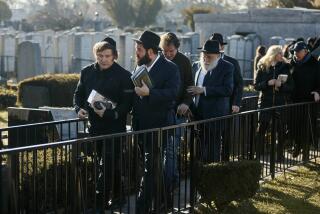Use of Rabbi for Political Purposes Sets Off Dispute
- Share via
JERUSALEM — It was the third day of the Jewish festival of Sukkot, and Rabbi Yitzhak Kadouri was celebrating with more than a dozen admiring aides and seminary students.
Seated in a large sukkah, the open-air booth that many Jews erect for the weeklong holiday marking the fall harvest, the elderly man raised his hands in blessing over plates of apples, grapes and dates. Each time he made a sound or shifted in his chair, the black-suited men around him leaned close, eager to catch his every utterance.
At the same time, several visitors outside Kadouri’s door in a poor neighborhood here clamored to be allowed inside. “We’ve come all the way from Tel Aviv,” Dalia Turkia, 56, pleaded with the teenage doorkeeper. “We need to see the holy rabbi.”
Kadouri’s popular appeal is undisputed. An Iraqi-born mystic said to be about 105 years old, the rabbi is sought out by an increasing number of Israelis who believe that he has the power to confer good or protect from evil. Believers carry Kadouri amulets, key chains and blessing cards, many bearing the image of the smiling, white-bearded rabbi in his fez-like hat.
But now, Kadouri is at the center of a swirling public controversy over the use--some say exploitation--of aged spiritual leaders in Israeli politics, and the dividing line between religion and politics in the Jewish state.
Beneath it all are poignant, unanswered questions about the elderly man’s lucidity. Aides refused to allow Kadouri to be interviewed but insist that he is very much aware of where he goes and who receives his blessings.
For nearly a decade, Kadouri, who rarely speaks in public, has been taken to political rallies organized by Shas, the ultra-Orthodox faction of Sephardic Jews that has become the third-largest political party in Israel’s parliament. Arriving by helicopter, he raises his arms over the crowd to convey his blessing and is greeted with huge applause.
As his popularity has grown, alongside the political influence of his adopted party, the rabbi has developed a following among Israeli politicians. Prime Minister Benjamin Netanyahu received a blessing just before his 1996 election. Shas is a key member of Netanyahu’s ruling coalition.
But David Levy, Netanyahu’s former foreign minister, whose constituency is drawn from the same Sephardic roots as that of Shas, recently sparked an uproar by questioning Kadouri’s mental capacity and complaining that the elderly man was being exploited.
“This Rabbi Kadouri, with all due respect, I’m not sure if he even knows where he is living, the poor guy,” Levy told an interviewer on Israel Radio last month. “He is being abused. Does he know whom he is blessing? Does he know what neighborhood he is being taken to?
“The use being made of him . . . takes us back to the Dark Ages, when people looked for good-luck charms and attributed divine qualities to a human being. This is real madness which must worry all of us,” Levy warned.
Shas officials said Levy was just jealous. His son recently tried and failed to gain a Kadouri blessing in a bid for political office, they noted. And they defended their practice of flying the rabbi to political rallies.
“The leftist parties bring their professors and lawyers and actors to support them and to say people should vote for their faction,” said Shlomo Benizri, a Shas member and deputy health minister. “Why is this OK but it is not OK for us to bring our rabbis, when they can advise us and influence many people to vote for us?”
But many others echoed Levy’s concern about the hitherto taboo subject. The chief rabbi of Israel’s Ashkenazi Jews said religious leaders should not be involved in politics at all, while the Sephardic chief rabbi said there was “exaggerated and improper use of rabbis” in politics.
After Levy’s comments, Labor Party leader Ehud Barak, who is trying to carve out a niche as the candidate of choice for secular Israelis, announced that he will no longer seek rabbinical endorsements. Netanyahu retorted that Barak couldn’t get them anyway.
More to Read
Sign up for Essential California
The most important California stories and recommendations in your inbox every morning.
You may occasionally receive promotional content from the Los Angeles Times.













